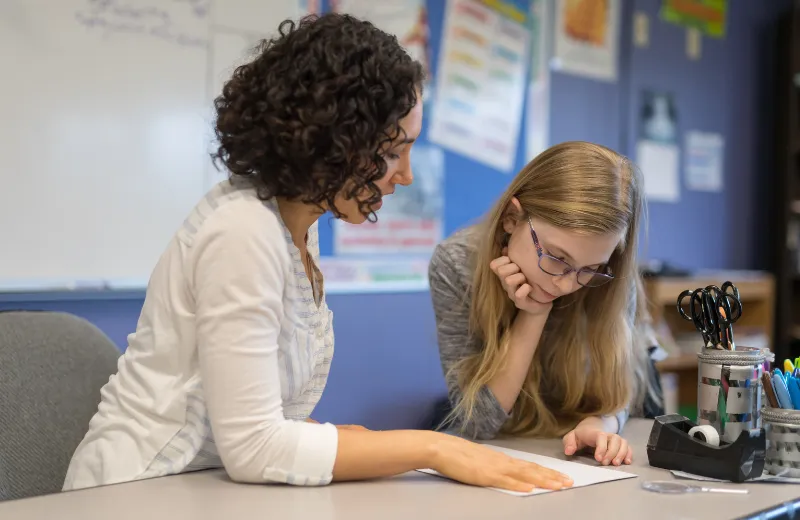

 Make a booking now
Campus Online Login
Make a booking now
Campus Online Login



Bring expert assessment in-house; the Certificate of Competence in Educational Testing (CCET) is the definitive, BPS-recognised course that could save your school time and money while empowering you to provide every student the precise support they need.
The Certificate of Competence in Educational Testing (CCET) will help you to understand how assessments using psychometric tests are developed, how to use them effectively, and how to interpret the results. We will show you how to test appropriately, what the available alternatives are, and the best ways to use them.
CCET holders are qualified to administer specific psychometric tests, including some used by Educational Psychologists. For example, tests such as the Comprehensive Test of Phonological Processing (CTOPP-2), Detailed Assessment of Speed of Handwriting (DASH-2), and the Test of Dyslexia (TOD) are all appropriate.
Please note that you are responsible for choosing and purchasing tests that align with your specific educational context and any previous professional qualifications you hold. Further details can be found in the ‘How can I access tests’ section.
The potential progression opportunities for CCET holders are clear and established:
Access Arrangements Assessor: CCET is the first step towards achieving the Certificate in Psychometric Testing, Assessment and Access Arrangements (CPT3A) and meeting the JCQ requirements to become an Access Arrangements Assessor.
Dyslexia Assessor: CCET could form part of your route to becoming a Dyslexia Assessor, eligible to apply for an Assessment Practising Certificate (APC).
Find out more about progression in the further study section.
Successful completion of this CCET course enables you to apply for the BPS Test User Educational qualification and to join the BPS’s Register of Qualifications in Test Use – a publicly searchable database of competence that will bolster your professional visibility.
Online
CCET Online is delivered entirely online via our Campus Online learning platform, which is accessible online anywhere, any time, so you won’t need to take time away from the classroom.
Intensive
Interested in a SOLD OUT date? Contact us and we’ll place you on our waiting list.
The course reflects the core competencies determined by the British Psychological Society.
Once you have completed CCET, if you hold an eligible qualification to teach, you will be able to take our Access Arrangements Course (AAC). By studying both of these courses, you will achieve the Certificate in Psychometric Testing, Assessment and Access Arrangements (CPT3A), qualifying you to meet the JCQ criteria for you to practise as an Access Arrangements assessor.
By successfully completing the Certificate of Competence in Educational Testing (CCET), you will be able to join any of our Masters programmes as if you have 30 credits.
You can either study this course online as self-paced study, or you can attend one of our 3-day intensive courses. Whichever route you take, you will be required to take the same assessments and produce a portfolio of evidence that demonstrates your competence.
Choose this route for fully-flexible learning, designed to fit around your existing commitments, without the requirement for you to be available at a particular time or place.
CCET Online is delivered as self-paced study via our Campus Online learning platform, which is accessible 24/7, so you won’t need to take time away from the classroom. You will be able to commence your studies once you have completed payment and registration. You’ll then be able to interact with your tutors and peers, track your own progress, and access a wealth of engaging and interactive resources, such as videos explaining key concepts, diagrams, multiple-choice questionnaires, and more.
For an interactive experience without travel costs, you can join our 3-day intensive course, delivered through Campus Live – powered by Adobe Connect, in real-time. Our CCET Intensive course has been designed for those who enjoy a more traditional learning approach and real-time interaction with their peers and tutor. Following the live sessions, you’ll receive access to Campus Online, our virtual learning platform, where you’ll access videos explaining key concepts, diagrams, multiple-choice questionnaires and more!
As part of your learning, you will need to produce a series of short multiple choice questionnaires focusing on:
For CCET you will need two tests, both of which need to be administered and scored manually (a computerised test will not be accepted) and must provide a standard score, confidence range and percentile.
If you intend to move onto AAC it is imperative that your tests are suitable for assessing Access Arrangements and you will need at least one test that assesses cognitive processing. If you intend to qualify as a Dyslexia Assessor, you’ll need to complete our Dyslexia – Professional Report Writing (DPRW) module (subject to eligibility). A specific test kit is required for this course.
Please visit our tests webpage for further information and guidance.
Real Group runs the Dyslexia Action Shop which sells many of the most popular tests from the main test publishers in the UK and USA. We offer delegates a 10% discount. Another option is to utilise our Study Purchase Scheme.
Please note: we have no control over the rules that publishers use to decide who is eligible to buy their tests and we will need to follow their guidance when selling tests. We may need you to provide information regarding qualifications for us to check your eligibility.
As CCET is an open-access course, no previous qualifications are required.
English language requirements
If you are not a native English speaker, to be eligible, you will need a high level of competence in the use of English, equivalent to at least 6.5 (with a minimum of 6 in each component) in the IELTS test or TOEFL 575 (paper based), 237 (computer based). You will be asked to confirm this as part of the booking process.
This course will be of particular interest if you work in the education sector and administer tests. You will need access to educational tests and will also need to be able to use tests in an educational setting.
A diverse group of professionals have completed this course – including teachers, SENCOs, Educational Psychologists, tutors and teaching assistants working in:
Interested in a SOLD OUT date? Please book for a future date and email us, we’ll be happy to place you on our waiting list.
Prefer to study online at your own pace? Choose our Online study option and you’ll be able to make a start as soon as you have completed payment and registration.
Self-paced online study:
Speak to us (01273 358080) or make a booking.
For further information please visit our payment FAQ page.
Speak to us about discounted bookings for online self-paced courses or bespoke 3-day intensive courses.
The duration of the CCET qualification is up to 8 months. Depending on your availability and level of prior experience, you could however achieve the CCET qualification in a shorter time-frame.
We do understand, however, that circumstances can arise that could prevent the course being completed in this time period. If this is the case, an extension can be arranged in conjunction with the admin team and your tutor.
‘This is the second course I have done with Real Training and I would recommend them to anybody. The course leaders are encouraging, supportive and prompt with feedback – I have even had guidance over the telephone! My career has gone from strength to strength since starting the course, as I have been able to take the lead on ALN developments and assessments due to the knowledge I have retained. I hope to continue studying with Real Training in order to gain a Masters in SEN.’ – Nadia
‘Excellent, detailed and professional advice. I really felt Kate would only accept the best standard work.’ – Sarah
‘It has been a massive learning curve – this was a whole new area for me and I was initially ‘out of my comfort zone’ but feel that I have had an invaluable training experience.’ – Lorraine
‘Fantastic course, it’s definitely a must!’ – Kirsha from Sunmarke School, U.A.E
‘Extremely informative and thought-provoking!’ – Donna from King’s School Al Barsha, U.A.E
‘One of the best courses I have attended. Informative, well delivered and organised.’ – Javene from GEMS First Point School, U.A.E‘
Amazing and should be a part of the general teaching qualification.’ – Tracey from GEMS Metropole School, U.A.E
If you choose to join the BPS RQTU, you will need to settle the fees directly with the BPS. While you are not obliged to do so, there are a number of professional benefits of being on the RQTU, including:
Find out more about the costs, benefits and how to apply on the BPS’s website.
Has your BPS registration expired?
If you completed a psychometric testing course with Real Training (CCET or CPT3A) and your registration on the BPS’s Register of Qualifications in Test Use (RQTU) has expired, please follow these useful instructions about how to maintain your BPS registration.

Kate is an educational psychologist and has been the principal tutor on CCET since its inception.
She has helped develop the teaching and learning activities that have made it the industry standard for those wanting to understand testing and assessment in an educational context. Kate is particularly interested in improving access arrangements and assessment of learners with sensory impairment.